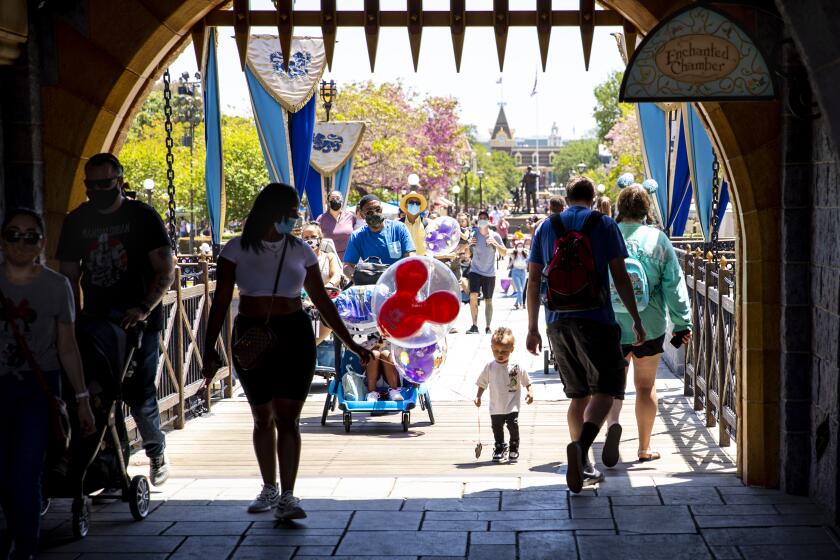Disney reaches class-wide settlement in lawsuit over Magic Key annual pass program

- Share via
Disneyland has reached a class-wide settlement in a federal lawsuit accusing the entertainment giant of deceiving people who bought top-tier yearly passes thinking they would get unlimited access to the park only to find that they were blocked in favor of daily-pass purchasers.
Notice of the agreement between Disney and self-described Disney enthusiast Jenale Nielsen — who brought the suit on behalf of all Dream Key pass holders — was filed in U.S. District Court last week, but the parties have until the end of next month to hash out the details of a preliminary agreement and formally ask the court to approve it.
“We are satisfied that this matter has been resolved,” Disney officials said in a statement emailed to The Times late Monday. They did not provide answers to questions about the proposed terms or the dollar amount of the settlement. Attorneys for Nielsen did not respond to a request for comment.
The lawsuit was filed in 2021, when Nielsen bought a $1,399 Dream Key pass — the top-tier annual pass — a month after the company launched its new Magic Key pass program. At the time, Nielsen alleged, Disney’s advertising said the Dream Key had “no block-out dates,” so she believed she could visit the Anaheim theme park any day she wanted.
Disneyland and Disney California Adventure have lifted rules about crowds and distancing. Fireworks are coming back. But some changes will stick.
But the pass required reservations, and not long after making her purchase that September, Nielsen discovered she couldn’t make a reservation for most of the days in November — including every single weekend all month, according to the suit.
“As a frequent Disneyland visitor, Ms. Nielsen thought it unlikely that all tickets and/or reservations for both Disneyland and California Adventure had already been sold out for seventeen of the 30 calendar days in November 2021,” the suit says.
When she checked the Disneyland reservation website, Nielsen saw the park was open for reservations for single- and multiple-day ticket buyers, who are charged up to $224 per visit, the suit alleges.
“The problem was not that Disney had reached its capacity and therefore could not provide reservations to its Dream Key pass holders,” the suit says. “The problem was that Disney had decided to block out reservations so that they were only available to new purchases and were not available to Dream Key pass holders.”
The suit also said the company appeared to be limiting the number of Dream Key pass holders who could visit per day to maximize single-day-pass sales, a practice that “directly contradicts Disney’s advertised promise” that Dream Key holders wouldn’t be subject to block-out dates.
Ranking the rides and attractions at Disneyland and California Adventure from best to worst is hard — but not impossible. Here is the ultimate Disneyland ride ranking.
Though the website through which the Dream Keys were sold said that reservations were “subject to availability and are not guaranteed for any specific dates or park,” Nielsen said buyers reasonably expected that Disney would not “artificially limit” the number of reservations available.
The lawsuit accused the media giant of breach of contract, negligent misrepresentation and unfair competition, and asked that the company be made to pay back pass holders and stop its “deceptive business practices.”
The company denied those allegations, saying its messaging was laid out on the website.
“We have been clear about the terms of the Magic Key product, and we know that many of our guests are enjoying the experiences these passes provide,” a Disney spokeswoman said after the suit was filed.
The case initially started in Orange County Superior Court but was moved to federal court because it was a potential class-action case involving $5 million or more. As of this month, the two sides were still battling over whether it would be a class action. The settlement notice filed Thursday says the agreement will resolve the case “in its entirety on a class-wide basis.”
Disney started selling the pricey passes in question two years ago, after ending the decades-old annual pass program during the pandemic.
Under the previous annual pass program, reservations weren’t needed, and annual-pass holders could visit as often as they wanted, as long as it wasn’t on a day marked as blocked. But when Disneyland reopened in April 2021 following a 15-month COVID-19 shutdown, the park began requiring reservations — even for participants in the new annual-pass program.
Disney does not release attendance figures, but the number of people who hold annual passes has long been believed to hover around 1 million.
More to Read
Sign up for Essential California
The most important California stories and recommendations in your inbox every morning.
You may occasionally receive promotional content from the Los Angeles Times.















